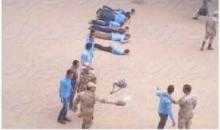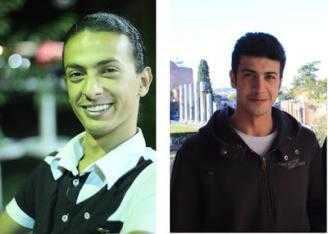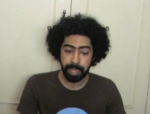Country report and updates: Egypt
1 Conscription
conscription exists
According to art. 58 of the constitution, "Defence of the homeland and its territory is a sacred duty and conscription is compulsory, in accordance with the law". Military service is regulated by the 1980 Military and National Service Act no. 127. [8]
military service
All men between 18 and 30 are liable for military service, which lasts for 3 years. [13] [14] [3] [6]
Graduated students serve for a period of 18 months. [6]
After serving, conscripts belong to the reserves for 7 years. [3]
postponement and exemption
Postponement is possible for students for the duration of their studies or until they are 28, and for various domestic reasons. Sons of retired men are exempted as long as an older brother is at service. [5] [6] [7]
Exemption from military service is possible for Jews, those with physical or mental disabilities, only sons of a family, and sons of Egyptian military killed during the 1973 war with Israel. [2] [5] [6] [7]
recruitment
If the number of conscripts exceeds the number needed in a given year, the Egyptian authorities may exempt the superfluous conscripts by drawing lots. [6]
According to the Egyptian Organisation for Human Rights, "those suspected of being members of the outlawed Islamic militant groups (...) are excluded from military service." [12]
2 Conscientious objection
There is no legal provision for conscientious objection and no substitute service. [2] [13] [7]
In 1991 at least 20 persons were detained not for conscientious objection, but for speaking out against Egyptian participation in the Gulf War. [4]
3 Draft-evasion and desertion
penalties
Refusal to perform military service is punishable by a year's imprisonment and a fine. [13]
Also they may be punished by a prolongation of their military service for one year in the case of graduated students and for three years in other cases. [7]
Draft evaders and deserters who have fled abroad cannot renew their passports. [7]
practice
Draft evaders and men of conscription age are not allowed to travel abroad. In order to obtain a passport all men must must prove they have completed military service or have been exempted. [9] [11]
The number of draft evaders is not known, but according to Agence France Presse in 1993 more than 4,000 draft evaders were arrested by the security forces. [10]
Those who have acquired double nationality or who are over 30 and have avoided military service may get exempted but must pay a fine. [6]
5 History
National service was introduced in 1955. [3]
During the wars with Israel, many fled abroad to avoid conscription. Two Egyptian conscripts who had refused to participate in the war were not granted asylum in the Netherlands and were expelled in 1972. [1]
6 Annual statistics
The armed forces comprise 450,000 troops, including some 320,000 conscripts (71 percent). They form 0.7 percent of the population. There is a 254,000 strong reserve force. [14]
Every year approximately 585,000 men reach conscription age. [14]
Sources
[1] Krieken, P.J. van 1976. Deserteurs, dienstweigeraars en asielrecht. Van Gorcum, Assen, Netherlands. [2] Eide, A., C. Mubanga-Chipoya 1985. Conscientious objection to military service. United Nations, New York. [3] Société I3C 1987. Military Powers, the league of Arab states, vol 2. Société I3C, Paris, France. [4] 'You can jail the resister but not the resistance', in: Peace News, 1 March 1993. London, UK. [5] DIRB 1991. Telephone interview with a representative of the Embassy of Egypt in Ottawa, 14 May 1991. [6] DIRB 1991. Telephone interview with a representative of the Arab League, Ottawa, 14 May 1991. [7] IRBDC 1992. Telephone interview with a representative of the Embassy of Egypt in Ottawa, 12 and 14 May 1992. [8] UN Commission on Human Rights 1992. Report of the Secretary-General prepared pursuant to Commission resolution 1991/65 (and 3 Addendums). United Nations, Geneva. [9] IRBDC 1993. Telephone interview with a representative of the Embassy of Egypt in Ottawa, 16 November 1993. [10] Agence France Presse (AFP), 27 May 1993. [11] US State Department 1997. Country reports on Human Rights Practices for 1996. Washington DC. [12] IRBDC 1997. Letter from Egyptian Organisation for Human Rights, 5 April 1997. [13] UN Commission on Human Rights 1997. The question of conscientious objection to military service. United Nations, Geneva. [14] Institute for Strategic Studies 1997. Military Balance 1997/98. ISS, London, UK.
Recent CO action alerts: Egypt
Recent stories on conscientious objection: Egypt
No to Compulsory Military Service Movement supports the Conscientious Objector Kamal El-ghety in his request to be excepted from the compulsory Military Education subject. The universities organization law requires every Egyptian male student to attend a subject on Military Education in order to get his graduation certificate.
Kamal has submitted a written request addressed to Cairo University dean Mr. Gaber Gad Nassar asking him to exclude the former from attending the Military Education subject. The subject contradicts with his pacifist beliefs, and his discomfort with being used as a tool in armed conflicts. The subject promotes for values such as blind disobedience making it a crime to reject any order as well as it discriminates between Egyptians on terms of their gender, according to El-ghety. Forcing El-ghety to attend the subject is a blatant violation of the international law, and article 18 of the International Covenant on Civil and Political rights in particular that bans any “coercion which would impair his freedom to have or to adopt a religion or belief of his choice.” Cairo University has rejected El-ghety’s request.
WRI's Egyptian affiliate NoMilService are working with a new conscientious objector, Samir Elsharbaty. Samir has requested his exemption from the service in March. You can find NoMilService's statement supporting him here.
On the 20th of May 2015, Egypt’s minister of defense, Sedki Sobhi, issued an executive order to exempt the two Egyptian conscientious Objectors, Mark Nabil Sanad and Mostafa Ahmed El-Saied, permanently from the military service. Both conscientious objectors have been living in a legal limbo for over a year, struggling for recognition as conscientious objectors. The decision of the minister of defense didn’t recognize them as conscientious objectors, but decided to exempt them from the service permanently.
Over 30 peace and human rights organizations have declared their support and solidarity with the Egyptian 'No to Compulsory Military Service Movement' and the conscientious objector, Mark Nabil Sanad. The statement can be read here. You can help by signing it.
For organizations, please send an email to NoMilService@gmail.com
We, peace and human rights organizations, declare our support and solidarity with No to Compulsory Military Service Movement and with the Egyptian conscientious objector, Mark Nabil Sanad. We condemn the silence of Egypt’s authorities over conscientious objectors’ suffering. We call on the Egyptian authorities to restore his civil rights and to recognize his right to an exemption from the military service based on his conscientious beliefs.
Together, we in No to Compulsory Military Service (Egypt) and New Profile (Israel) confirm our support of peace and of conscientious objectors in both countries, re-affirming the human right to freedom of conscience, faith and self-determination.
On 12 April 2012, Emad El Dafrawi declared his conscientious objection to military service, and thus became the second publicly known conscientious objector in the country, after Maikel Nabil Sanad. In his conscientious objection declaration, Emad El Dafrawi writes: "I’m pacifist and anti-militarist, which means that the military activities including holding weapons and using violence contradict my beliefs. I’m a conscientious objector to the military service. I refuse to obey military orders and I consider all wars to be crimes."
Yesterday, on 12 April 2012, Emad El Dafrawi declared his conscientious objection to military service, and thus became the second publicly known conscientious objector in the country, after Maikel Nabil Sanad.
In October, War Resisters' International again visited Egypt, in support of imprisoned pacifist blogger Maikel Nabil Sanad, who is on hunger strike since 23 August 2011. The objective was to be present during the appeal hearing at the military court on 11 October 2011, and to show solidarity.






